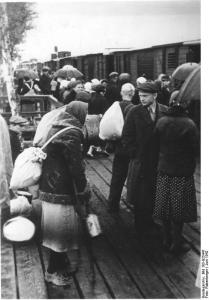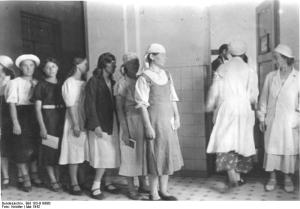Here in Germany, my kids aren’t old enough to learn about the Nazi era in school yet. So I recently jumped at the chance to see what high school-age students were doing. It’s hard enough getting young people interested in all that old stuff. And anything short of virtual reality probably wouldn’t impress them, right?
So off I went to what the press was calling a “lecture performance” of 12th graders from the Burggymnasium in Essen. The venue piqued my interest too; the performance took place in the wartime air raid bunker under the city archive.

Soviets deported to Germany, June 1942. Bundesarchiv, Bild 183-B25447 / CC-BY-SA 3.0
But first we crowded into the archive’s foyer in front of a table where two students in blouses and braided hair sat working. Cheerful period music was echoing in the hall, and it made me feel a little uneasy. We were there to learn about forced labor in wartime Germany – hardly cheerful. In clipped tones, the students called for us to get in line. It was dawning on some of us that the performance had already started.
When we entered the building, we were handed a card with a number and had been told it would be used to divide up the groups since the bunker space was so small. But once we got to the table in the foyer, we gave up the first number and were given another — mine was 721 — written on white tape. “Wear it in a visible place,” they told us. I slapped mine on my coat without asking what the number was for. I had a pretty good idea.
Numbered, I had to walk alone between two students in white shirts and dark pants. They stood at the foot of the stairway leading down to the basement. They held file folders, and as each of us walked by, they said in a bland tone, “Follow the directions.” Always this firm, impersonal tone. I was impressed and a little uneasy the students managed it so well.
In the narrow basement hallway, more students in white ordered us to go right or left. I joined the group waiting quietly in the right-hand hall. Maybe the others felt the same way I did, caught off balance by how quickly we obeyed what seemed like random orders.

Ukrainian women examined by German officials for work. May 1942. Bundesarchiv, Bild 183-B19880 / Knödler / CC-BY-SA 3.0
A door opened. This wasn’t the bunker yet, but a medium-sized room where thirty of us crowded inside. The windows were covered for the blackout. There were students in white shirts at a table with a scale, some bread and a cooking pot. There were students in baggy or shabby clothes lined up, their heads bowed. The “man in charge” talked to us then, complained about how hard it was to feed these people — the shabby ones, the Ukrainians dragged to Germany to work. When he had a question for us, he barked, “How much did a slave worker eat per day, number 721?” We looked down at the numbers on our coats, trying to remember who (what?!) we were. He talked about duty, and how if he wasn’t firm, if he failed in his duty, his own family would suffer. At which point he gave one of the student-slaves a mock kick and walked off.
The slaves spoke too — at first about home. How much they missed it, how their home gave them strength to endure. One scrubbed the floor as she talked about her fear of getting sick, of not being able to work anymore. It was uncomfortable having to look down on her the whole time. An air raid and sudden darkness, and we were evacuated out of the room.
To the bunker. Through a narrow door, we climbed into a nest of rooms with bare and dusty walls. Here and there, someone had stenciled the capacity the rooms had — 25 people, for instance, in a space too small to be comfortable. As we wandered from room to room, students acting as slaves told their stories of being snatched from their villages in the Ukraine or Russia. The journey to Germany in freight trains and the yearning for fresh air, space and freedom. Their work — sometimes with German families who treated them kindly; more often in factories, especially in Essen, where they were worked to exhaustion or death. Two students were closed into a replica of the famous steel locker used as an isolation cell and punishment for forced labor. There was poetry and artwork and period photos beamed on the walls. A group of students sang about home in German and Russian to a guitar accompaniment.
When we left the claustrophobic nooks and crannies of the bunker, the performance was over. My first thought was — these 12th graders put together one of the most informative and moving bit of living history I’d ever experienced. They had studied the testimony of forced labor and the Germans in charge of them to understand what went on in their own words. Students who spoke Russian translated some documents fully into German for the first time. But it was the performance itself, creating it, writing it and performing, that brought the students closer to the tens of thousands of slave workers forced to come to Essen more than 70 years ago.
An excellent performance and a great experience. Bravo.



